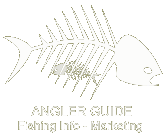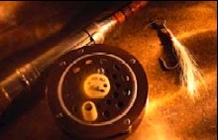|
Article by Ben Arellano of Angler Guide
Photos by Spence Warner
Few rivers in
America
provide fishing experiences to match that of the South Fork of the
Snake River. The Snake River begins high in Yellowstone
National Park and flows through Grand Teton National Park into Palisades
Reservoir which borders Wyoming and Idaho. Below Palisades Dam begins
the stretch of the river , referred to as the "South
Fork". The
river flows through Swan Valley in a generally northwest direction
until its confluence with the
Henry's Fork before flowing west through Idaho.
Fall
fishing on the South Fork in Swan Valley, Idaho.
 |
It is between the Henry's Fork confluence and Palisades Dam that
the South Fork is known as one of the finest dry fly rivers in
North America. All of the Fish in the South Fork are wild and fish between
eight and sixteen inches must be released because they are the prime
breeders. The South Fork
typically becomes fishable for the fly fisher sometime between the
first week of July and the middle of July, depending on the spring run
off. This year (2001) the run off was for a very short period,
thus fly fishing was productive in the middle of June. While dry fly
fishing clearly ranks as the number one preferred fly fishing
technique amongst anglers, streamers and nymphing can be equally
effective if the larger trout aren't rising. Hatches are
normally in full-swing by late June and July. The floating angler
should pay special attention to the banks, foam lines and
structure, making a point to anchor or get out and fish these
areas thoroughly. Caddis, mayfly and the stonefly hatches can
produce top-water feeding frenzies that trigger hot action to
those who happen to be on the water when its going on.
Moose
are a common site on the South Fork.
 |
On a good
day it's not unusual to catch twenty to thirty fish a day
with many being over twenty inches in length. When you fish the South Fork you
are also exposed to an abundance of wildlife, such as moose,
deer, elk, golden eagles, whopping cranes, many different water fowl
and other species even bear. There may be times when fish are
simply not biting. This is a good opportunity to enjoy the float and admire the
beautiful scenery and wildlife around you.
Most area anglers agree that their favorite season to fish the
South Fork is late Autumn. There are many days when hours
past before seeing another soul on the river. With autumn
also comes, lower water levels and the ability to wade more
areas. It also a good time to use streamers,
especially for large browns and cutthroats. A spinning rod and
reel and a good lure are not out of the question neither. Running
your streamer or lure along gravel bars and riffles is almost
guaranteed success.
Fall on the South Fork is really enjoyable as the fish are
aggressive, hit hard and put up a good fight. In winter, some
parts of the South Fork are not opened to fishing and you should
reference the fishing regulations. Generally fishing is slow but
there is always some good size fish taken out the South Fork.
If you have a jet boat chances are you can find some pretty good
fishing holes. Seldom do you see someone floating the South Fork
during the winter. At times you'll see fishing from the banks if
no ice is present.
Ron Obendorf sporting a male German Brown
caught on the South Fork.
 |
Tackle & Gear:
For most fishing on the South Fork
an eight to nine foot, four or five-weight rod is a good choice.
The exception would be when fishing large streamers down deep for
the large browns which are found in the river. For this a six or
seven-weight system would be the wiser choice, keeping in mind
that some of the browns can exceed 10 pounds.
|


